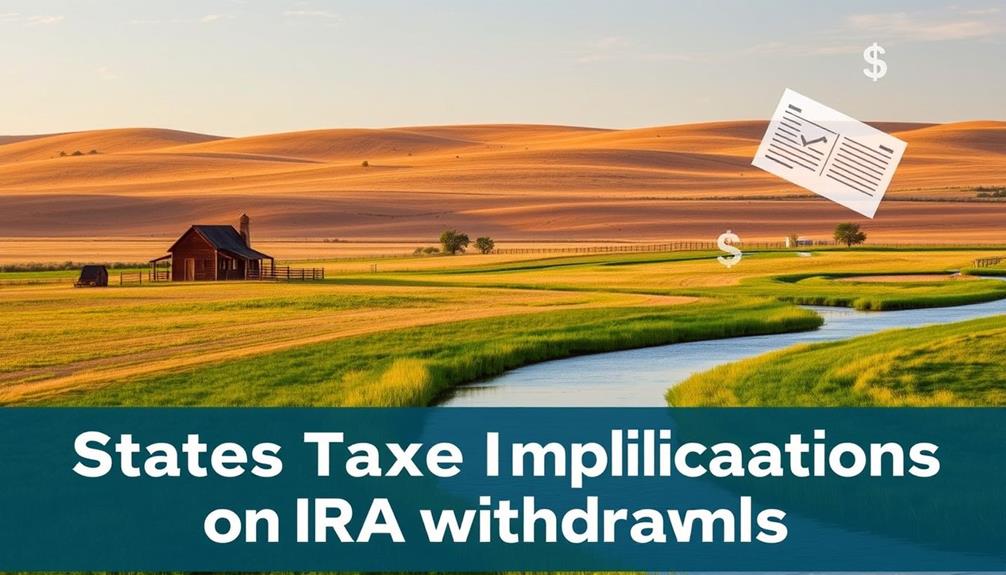When you make withdrawals from your IRA in Pennsylvania, it’s important to note that these distributions are typically subject to state income tax. If you are under 59 ½, all early withdrawals will be taxed, without any federal exceptions. However, once you reach 59 ½, your withdrawals will be tax-exempt at the state level. Pennsylvania has a flat income tax rate of 3.07% on these distributions, so it’s crucial to maintain detailed records to support your contributions. Keeping up-to-date with specific tax laws can help you effectively navigate this process, and there is more to explore on how this affects your financial planning.
Key Takeaways
- IRA withdrawals in Pennsylvania are subject to state income tax, regardless of age, except for those taken after age 59 1/2.
- Early withdrawals incur state income tax, with no exceptions recognized from federal laws.
- The taxable amount includes distributions that exceed previously taxed contributions to the IRA.
- Pennsylvania has a flat income tax rate of 3.07% applied to all IRA distributions.
- Keeping detailed records of contributions and withdrawals is essential for substantiating tax calculations.
Overview of IRA Withdrawals in PA

When it comes to understanding the intricacies of IRA withdrawals in Pennsylvania, it's important to grasp the state's tax implications. Generally, IRA withdrawals are subject to Pennsylvania income tax unless you take them after age 59 1/2 when they become tax-exempt.
If you withdraw funds early, before reaching that age, you'll face state income tax, regardless of your retirement status or any federal exceptions that may apply.
It's significant to understand the taxable portion of your IRA withdrawal. This includes any distributions exceeding the contributions that have already been taxed.
So, if you've made non-deductible contributions to your IRA, you can expect a portion of your withdrawal to be taxable at the state level.
To maintain compliance with Pennsylvania tax laws, having the required documentation on hand is critical. This documentation substantiates both your contributions and your withdrawals, helping to clarify your tax obligations.
Be mindful that Pennsylvania doesn't recognize federal exceptions for early withdrawals, so you'll need to plan accordingly to avoid unexpected tax liabilities. Understanding these nuances will help you navigate the complexities of IRA withdrawals in Pennsylvania effectively.
Tax Treatment of Early Withdrawals

Early withdrawals from your IRA can lead to significant tax implications in Pennsylvania, especially if you're under age 59 1/2. Unlike federal regulations, Pennsylvania taxes early withdrawals regardless of your retirement status. This means your distributions will be regarded as income taxable, adding a layer of complexity to your tax planning.
Here are some key points to take into account:
- State Income Tax: Pennsylvania doesn't recognize federal exceptions, so state taxes still apply.
- Cost Recovery Method: The taxable amount includes distributions that exceed previously taxed contributions.
- Equal Payments: Even if you take early withdrawals in equal payments, they're still subject to state income tax.
- Documentation: Keep meticulous records of your contributions and withdrawals to substantiate your tax calculations.
- Financial Advisor: Consult a financial advisor to navigate these implications and update your tax strategy.
Understanding these factors is vital to optimizing your retirement income and ensuring compliance with Pennsylvania taxes.
Proper tax planning can help you mitigate potential tax liabilities associated with early withdrawals.
Comparison With Federal Tax Regulations

Comparing Pennsylvania's tax treatment of IRA withdrawals with federal regulations reveals significant differences that can impact your financial strategy.
While federal tax laws allow tax-free withdrawals after age 59 1/2, Pennsylvania state income tax applies to all IRA distributions, regardless of age. This means if you take early withdrawals before reaching that age, you'll face state taxes, even if federal exceptions might apply.
In Pennsylvania, the taxable amount for state income tax includes only the distributions that exceed previously taxed contributions, following the cost recovery method. This means your contributions are removed first before taxing any untaxed amounts.
On the other hand, federal taxation may vary based on your income brackets. Additionally, Pennsylvania imposes a flat income tax rate of 3.07% on these distributions, contrasting with the progressive rates at the federal level.
It's also important to note that payments made to an estate or beneficiary upon your death are considered non-taxable payments under both federal and Pennsylvania laws, highlighting a key distinction from regular withdrawals.
Understanding these differences is essential for effective retirement planning and tax management.
Resources for Navigating State Taxes

Maneuvering state taxes can feel overwhelming, but several resources are available to help you manage the implications of IRA withdrawals in Pennsylvania. The Pennsylvania Department of Revenue is your go-to source for essential information about state tax laws that affect retirement income.
Here are some key resources to assist you:
- Website: Visit the Pennsylvania Department of Revenue website for up-to-date tax laws and regulations.
- Online Tools: Use online tools on the PA Revenue Home site for filing inquiries and payment options, making the process smoother.
- Tax Forms: Access specific tax forms related to IRA withdrawals to guarantee compliance with state regulations.
- Customer Service: Reach out for personalized support through customer service options available for inquiries about state tax obligations.
- Updates: Stay informed with regular updates on changes to tax laws that may impact your IRA distributions.
These resources can help clarify your responsibilities regarding state tax and guarantee you're prepared for any implications of your IRA withdrawals.
Don't hesitate to utilize them to navigate your retirement income effectively.
Future Considerations for Tax Changes

As you plan for retirement, it is essential to keep an eye on potential changes to Pennsylvania's tax laws that could impact your IRA withdrawals. Legislative changes may arise that could affect your tax liabilities, and economic conditions could shift the relatively low retirement tax landscape in the state. Advocacy groups, actively lobbying for reforms, may influence how Pennsylvania tax applies to IRA withdrawals in the future.
To help you navigate these possibilities, consider the following table summarizing key future considerations:
| Factor | Current Status | Potential Changes |
|---|---|---|
| Income Taxes | Relatively Low | Possible Increases |
| Federal Income | Subject to Federal Law | No Immediate Change |
| Property Tax Reduction | Available for Seniors | Potential Adjustments |
| Income Limit for Benefits | Set by State | Could be Revised |
Staying informed about these developments is a must. Regularly consult with tax professionals who can help you adapt your strategies to align with any future tax changes. Being proactive now can guarantee that your retirement income isn't adversely affected down the line.
Frequently Asked Questions
Do You Pay State Tax on IRA Withdrawals in Pa?
Yes, you pay state tax on IRA withdrawals in Pennsylvania if you take them before age 59 1/2. After that age, most withdrawals aren't taxed, but early distributions always incur state income tax.
Do I Have to Pay State Taxes on an IRA Withdrawal?
When the weight of financial decisions bears down, you might wonder if you've got to pay state taxes on your IRA withdrawal. Yes, you do, as Pennsylvania taxes all distributions at a flat rate.
Are IRA Contributions Taxable in Pa?
In Pennsylvania, your traditional IRA contributions aren't taxable. You won't pay state taxes on those contributions. However, Roth IRA contributions, made with after-tax dollars, aren't deductible on your state income tax returns.
What Is the Pennsylvania State Tax on a 401K Withdrawal?
When it comes to your 401(k) withdrawal, you'll find Pennsylvania's got a flat state tax rate of 3.07%. Don't forget, local taxes might also apply, especially if you're in places like Philadelphia.
Conclusion
In maneuvering IRA withdrawals in Pennsylvania, you've got to stay sharp about the state tax implications. Remember, the rules can change, just like the shifting sands of time. Whether you're taking early withdrawals or planning for retirement, understanding these nuances is key to keeping your hard-earned savings intact. So, as you prepare for what's ahead, think of your future self—make informed decisions now to guarantee a brighter financial tomorrow.









